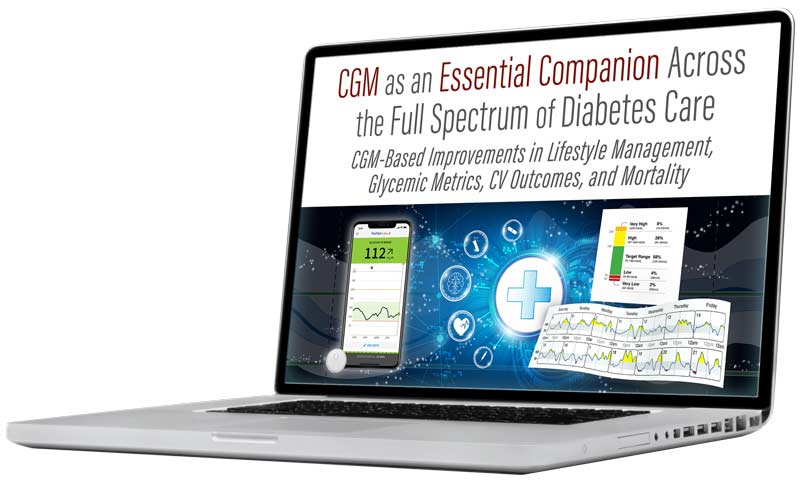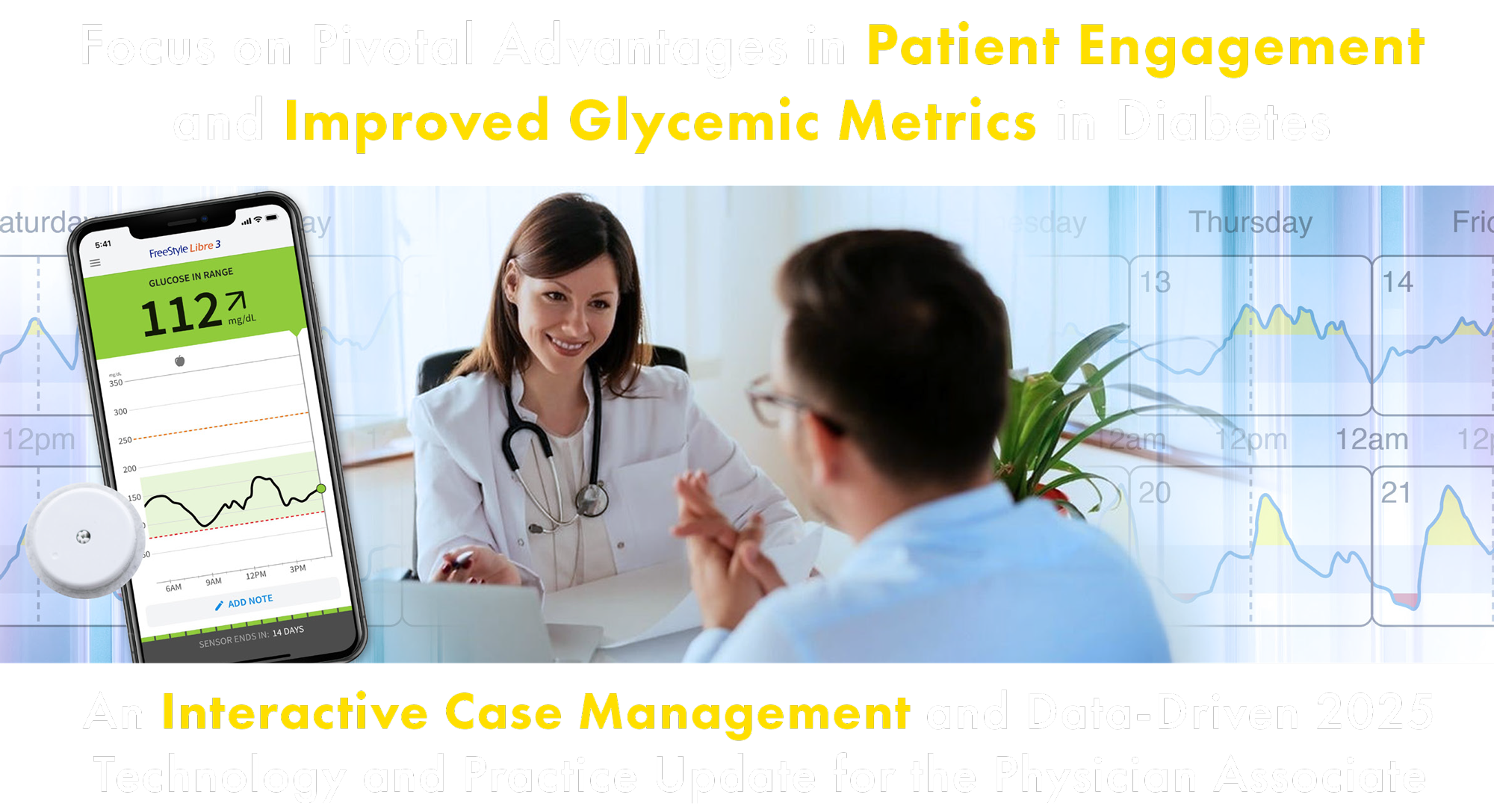SAVE THE DATE:
You and your physician associate colleagues are invited to
An AAPA 2025 Satellite Symposium on

Save the Date and Time – Register Now!
Friday, May 16, 2025
Dinner and Registration: 6:00 PM – 6:30 PM
Scientific Program: 6:30 PM – 8:00 PM
Location: Colorado Convention Center

For more information:
info@cmeducation.net
Program Agenda
6:00 PM – 6:30 PM
Dinner and Registration
6:30 PM – 6:45 PM
The Foundational Role of CGM for Outcome-Optimizing Behavioral and Lifestyle-Based Interventions
Ashlyn Smith, MMS, PA-C – Program Chair
Adult Endocrine Physician Assistant
President, American Society of Endocrine Physician Assistants
Adjunct Assistant Professor, Midwestern University
Scottsdale, AZ
6:45 PM – 7:15 PM
CGM-Mediated Improvements in HA1c and Regimen Adherence in the Setting of GLP-1 Agonists
James R. Gavin, MD, PhD
Clinical Professor of Medicine
Emory University School of Medicine
Clinical Professor of Medicine
Indiana University School of Medicine
7:15 PM – 7:45 PM
The Profound Positive Impact of CGM on Glycemic Control and Patient Engagement
Eden Miller, DO
Founder
Diabetes and Obesity Care LLC
St. Charles Hospital
Bend, OR
7:45 PM – 8:00 PM
Translating CGM Technologies into Real World Case-Based Management Across the Full Spectrum of Diabetes Cares
Interactive Case Study Session
Ashlyn Smith, MMS, PA-C – Program Chair
Adult Endocrine Physician Assistant
President, American Society of Endocrine Physician Assistants
Adjunct Assistant Professor, Midwestern University
Scottsdale, AZ
Program Chair and Distinguished Faculty
Ashlyn Smith, MMS, PA-C
— Program Chair

Adult Endocrine Physician Assistant
President, American Society of Endocrine Physician Assistants
Adjunct Assistant Professor, Midwestern University
Scottsdale, AZ
James R. Gavin, MD, PhD

Clinical Professor of Medicine
Emory University School of Medicine
Clinical Professor of Medicine
Indiana University School of Medicine
Eden Miller, DO

Founder
Diabetes and Obesity Care LLC
St. Charles Hospital
Bend, OR
EDUCATIONAL AND LEARNING OBJECTIVES
Upon completion of this activity, participants will be able to:
- Outline and discuss the evidentiary basis for senor/patch-based CGM technologies, and how to best Implement CGM-based technologies into their overall diabetes care plans for patients with T1D and T2D.
- Analyze the rationale and evidence for recommending and facilitating adoption of technology-centric CGM monitoring and treatment plans using patch-and-reader-based technologies.
- Compare and contrast available CGM-facilitating monitoring technologies and pair such technologies with optimal patient profiles.
- Educate patients with diabetes about the rationale, evidence, and outcome- optimizing results associated with technology-based, patient-centric and physician-directed CGM monitoring strategies that can be used to effect optimal lifestyle, diet-, and pharmacology-based approaches to attaining guideline-based HA1c levels in patients with T1D and T2D.
- Identify which patients with diabetes are ideal candidates for a technology-based, patient-directed glucose monitoring system.
- Translate landmark clinical studies focused on CGM-based technologies to the front lines of clinical practice in the diabetes and primary care setting; and understand the translational implications of deploying sensor-based, CGM-based technologies as a foundational approach to improving outcomes in patients across the spectrum of diabetes.
- Educate other clinical providers on the diabetes care team about the rationale, role, evidence, and outcome-enhancing results that are deriv.
TARGET AUDIENCE — WHO SHOULD ATTEND
This Clinical Excellence Summit is directed at the following: diabetes and endocrinology specialists and researchers and related healthcare providers who manage patients with Type 2 or Type 1 diabetes.
GRANTOR SUPPORT
Supported by an educational grant from Abbott Diabetes Care.
ACCREDITATION STATEMENT
This activity has been planned and implemented in accordance with the accreditation requirements and policies of the Accreditation Council for Continuing Medical Education (ACCME) through the joint providership of the University of Massachusetts Chan Medical School and CMEducation Resources, LLC. The University of Massachusetts Chan Medical School is accredited by the ACCME to provide continuing medical education for physicians.
CREDIT DESIGNATION STATEMENT
The University of Massachusetts Chan Medical School designates this enduring material for a maximum of 1.5 AMA PRA Category 1 Credits(s)™. Physicians should claim only the credit commensurate with the extent of their participation in the activity.
FACULTY & PROVIDER DISCLOSURE
It is the policy of the University of Massachusetts Chan Medical School to ensure fair balance, independence, objectivity and scientific rigor in all activities. All faculty participating in CME activities sponsored by the University of Massachusetts Chan Medical School are required to present evidence-based data, identify and reference off-label product use and disclose all relevant financial relationships with those supporting the activity or others whose products or services are discussed. Faculty disclosure will be provided in the activity materials.
This program is not yet approved for CME credit. Conference organizers plan to apply for 1.5 AAPA Category 1 CME credits from the AAPA Review Panel. The total number of approved credits is yet to be determined.
———
